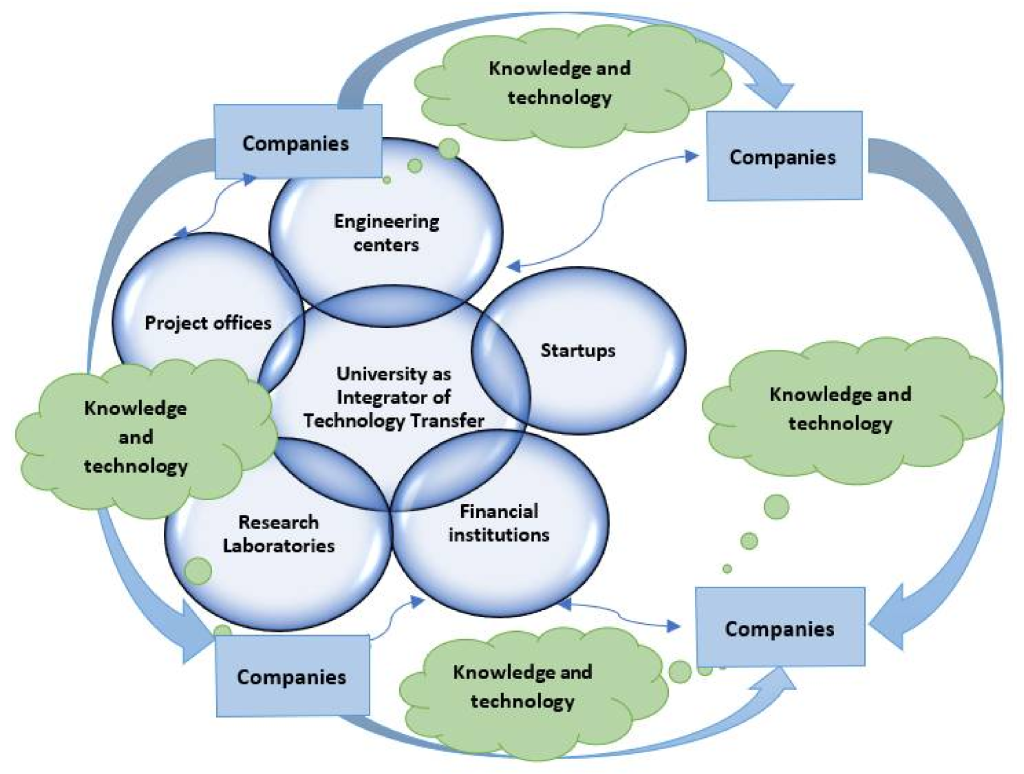Unlocking The Power Of Innovation Technology Knowledge Transfer: Take Action Now!
Innovation Technology Knowledge Transfer: Unlocking the Power of Ideas
Introduction
Welcome, Readers, to a world where innovation and technology converge, giving birth to groundbreaking discoveries and advancements. In this era of rapid evolution, the concept of knowledge transfer plays a pivotal role in shaping the progress of societies across the globe. By sharing expertise, ideas, and insights, we can transcend boundaries and propel humanity towards a brighter future.
1 Picture Gallery: Unlocking The Power Of Innovation Technology Knowledge Transfer: Take Action Now!

Innovation technology knowledge transfer refers to the process of exchanging and disseminating knowledge, skills, and ideas related to technological advancements. It involves the transmission of expertise from one individual, organization, or country to another, facilitating the adoption and implementation of innovative practices. Through this transfer, both developed and developing nations can leverage the power of technology to address societal challenges and drive economic growth.
Now, let us embark on a journey to explore the nuances of innovation technology knowledge transfer, its key players, timeline, geographical implications, underlying motivations, and the methodologies employed to make this transfer a reality.
What is Innovation Technology Knowledge Transfer? 🌐

Image Source: mdpi.com
Innovation technology knowledge transfer refers to the process of transmitting knowledge, ideas, and skills related to technological advancements from one entity to another. It involves the exchange of information necessary to implement and leverage technology-driven solutions in various sectors. This transfer is essential for fostering innovation, driving economic growth, and addressing societal challenges on a global scale.
The Importance of Innovation Technology Knowledge Transfer
By facilitating the transfer of knowledge and expertise, innovation technology knowledge transfer plays a crucial role in promoting economic development, accelerating the pace of innovation, and addressing global challenges. It allows for the adoption and implementation of technological advancements, empowering individuals, organizations, and nations to thrive in a rapidly evolving digital landscape.
Who are the Key Players in Innovation Technology Knowledge Transfer? 🤝
Innovation technology knowledge transfer involves various stakeholders who contribute to the dissemination of knowledge and ideas. These include:
Research institutions and universities: These institutions serve as hubs for knowledge creation and play a vital role in transferring their research findings to industries and communities.
Government organizations and policymakers: Governments play a crucial role in creating policies and frameworks that promote the transfer of technology and knowledge between different entities.
Technology companies and startups: These entities are at the forefront of innovation and often drive the transfer of technology and knowledge through their products, services, and collaborations.
International organizations: Bodies like the United Nations and World Bank facilitate knowledge transfer initiatives at a global level, promoting collaboration and cooperation between nations.
When Does Innovation Technology Knowledge Transfer Occur? ⏱️
Innovation technology knowledge transfer can occur at various stages of technological advancements. It can take place during research and development, the commercialization phase, or even after a technology has been implemented. Knowledge transfer can happen in real-time or through long-term collaborations, depending on the complexity and scope of the innovation.
Where Does Innovation Technology Knowledge Transfer Happen? 🌍
Innovation technology knowledge transfer is not bound by geographical boundaries. It can occur at local, regional, national, and international levels. Collaboration and exchange can take place within countries, between neighboring nations, or across continents. With the advent of digital communication and globalization, the transfer of knowledge has become increasingly accessible, allowing for cross-border collaborations and partnerships.
Why is Innovation Technology Knowledge Transfer Essential? 💡
There are several compelling reasons why innovation technology knowledge transfer is essential:
Accelerating innovation: By sharing knowledge and expertise, innovation technology knowledge transfer helps accelerate the pace of innovation, enabling the development and implementation of new technologies.
Addressing societal challenges: Technology-driven solutions have the potential to address pressing societal challenges such as poverty, healthcare, education, and climate change. Knowledge transfer ensures that these solutions reach those who need them the most.
Fostering economic growth: Innovation technology knowledge transfer plays a crucial role in driving economic growth by facilitating the adoption and diffusion of technologies, creating new markets, and enhancing productivity.
Promoting global collaboration: Knowledge transfer encourages collaboration and cooperation between nations, fostering a sense of shared responsibility towards addressing global challenges.
How Does Innovation Technology Knowledge Transfer Happen? ❓
Innovation technology knowledge transfer can occur through various channels and methodologies, including:
Collaborative research projects: Universities, research institutions, and industries collaborate on research initiatives, sharing knowledge and resources.
Technology licensing and intellectual property agreements: Companies transfer their technology and knowledge through licensing agreements, allowing others to use their intellectual property.
Training programs and workshops: Knowledge transfer often takes place through structured training programs and workshops, where experts share their insights and skills with others.
International collaborations and partnerships: Nations collaborate on innovation initiatives, sharing knowledge, resources, and best practices to drive technological advancements.
Advantages and Disadvantages of Innovation Technology Knowledge Transfer
Advantages of Innovation Technology Knowledge Transfer ✅
1. Enhanced innovation capabilities: Knowledge transfer fosters a culture of innovation, enabling individuals and organizations to enhance their capabilities and develop new technologies.
2. Economic growth and development: By transferring technology and knowledge, countries can drive economic growth, create new job opportunities, and improve the standard of living.
3. Collaborative advantage: Knowledge transfer encourages collaboration between entities, leading to the pooling of resources, expertise, and perspectives, resulting in more robust and impactful solutions.
4. Addressing global challenges: Through knowledge transfer, technology-driven solutions can be disseminated to address pressing global challenges such as climate change, healthcare, and poverty.
5. Bridging the digital divide: Knowledge transfer can bridge the digital divide by ensuring that technological advancements reach underserved communities, reducing inequalities.
Disadvantages of Innovation Technology Knowledge Transfer ❌
1. Dependency on external expertise: While knowledge transfer is beneficial, it can create a dependency on external expertise, limiting the development of local capabilities and self-sufficiency.
2. Intellectual property concerns: Transferring technology and knowledge can raise concerns about intellectual property rights, leading to conflicts and disputes between entities.
3. Cultural and contextual challenges: Knowledge transfer may face challenges in adapting technologies to different cultural, social, and environmental contexts, requiring careful consideration and customization.
4. Technological disparities: The transfer of technology may accentuate existing technological disparities between developed and developing nations, widening the digital divide.
5. Ethical considerations: Knowledge transfer raises ethical considerations regarding the responsible and equitable use of technology, ensuring that it benefits all segments of society.
Frequently Asked Questions (FAQs)
Q1: How can innovation technology knowledge transfer benefit developing countries?
A1: Innovation technology knowledge transfer can benefit developing countries by providing access to advanced technologies, knowledge, and expertise that can drive economic growth, address societal challenges, and improve the quality of life for their citizens.
Q2: Does innovation technology knowledge transfer only occur between countries?
A2: No, innovation technology knowledge transfer can occur within countries, between organizations, and even between individuals. It is not limited to geographical boundaries.
Q3: What role do intellectual property rights play in innovation technology knowledge transfer?
A3: Intellectual property rights play a crucial role in innovation technology knowledge transfer, as they protect the rights of innovators and provide incentives for sharing knowledge and technology while ensuring fair compensation.
Q4: How can innovation technology knowledge transfer contribute to sustainable development?
A4: Innovation technology knowledge transfer can contribute to sustainable development by enabling the adoption of technologies that address environmental challenges, improve resource efficiency, and promote green practices.
Q5: What are some potential barriers to innovation technology knowledge transfer?
A5: Potential barriers to innovation technology knowledge transfer include lack of funding, limited access to technology, cultural and language barriers, intellectual property concerns, and inadequate infrastructure.
Conclusion: Embracing the Power of Knowledge Transfer
As we conclude this exploration of innovation technology knowledge transfer, it becomes clear that sharing knowledge, ideas, and expertise is crucial for driving progress and addressing the challenges of our time. By embracing the power of knowledge transfer, we can unlock the full potential of innovation and technology, transforming societies and shaping a better future for all.
Now is the time for individuals, organizations, and nations to come together, collaborate, and strive towards a world where knowledge knows no boundaries. Let us harness the power of innovation technology knowledge transfer, making it a driving force that propels us towards a brighter, more inclusive, and sustainable future.
Final Remarks: Embracing the Journey Ahead
As we embark on the journey of innovation technology knowledge transfer, it is essential to acknowledge that success requires dedication, collaboration, and a commitment to constant learning. While challenges may arise, the potential rewards are limitless.
Let us embrace this journey with open minds and open hearts, recognizing that innovation technology knowledge transfer holds the key to unlocking a future filled with endless possibilities. Together, we can shape a world where the power of ideas and technology transcends borders, propelling humanity towards a future of prosperity and well-being. The journey begins now; let us seize the opportunities that lie ahead.
This post topic: Technology Innovation
